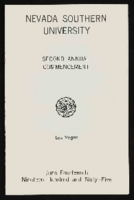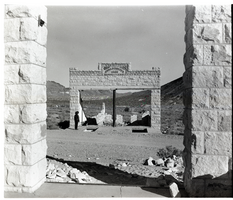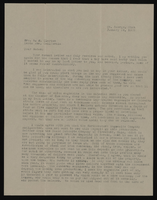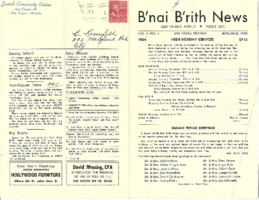Search the Special Collections and Archives Portal
Search Results
Las Vegas PRIDE Parade Records
Identifier
Abstract
The Las Vegas PRIDE Parade Records (2016-2017) contain administrative files that document how the Southern Nevada Association of PRIDE, Inc. (SNAPI) organized the 2016 and 2017 PRIDE parades in Las Vegas, Nevada. Materials include correspondence with event organizers, parade participant information, and PRIDE event guides.
Archival Collection
Nevada State Senator Bob Coffin Records of the Kathy Augustine Impeachment Trial
Identifier
Abstract
Nevada State Senator Bob Coffin Records of the Kathy Augustine Impeachment Trial (2004) contains exhibits, testimonies, witness lists, questions posed, computer forensic evidence, correspondence, newspaper clippings, magazine articles, and printed legislative materials. Also included are 21 DVD recordings of the trial.
Archival Collection
Paul E. Meacham Faculty Papers
Identifier
Abstract
The Paul E. Meacham Faculty Papers (approximately 1977-1998) are comprised of articles and reports relating to the development of community colleges as well as organization and administration in higher education throughout the United States. The collection also includes course readers for EDA 731 Organization and Administration in Higher Education taught at the University of Nevada, Las Vegas.
Archival Collection
Union Plaza Photograph Collection
Identifier
Abstract
The Union Plaza Photograph Collection, approximately 1970 to 1971, consists of photographic prints and negatives taken during the construction of the Union Plaza Hotel and Casino in downtown Las Vegas, Nevada. Images portray the construction process, the surrounding area and businesses, and the completed project.
Archival Collection
Larry A. Strate Faculty Papers
Identifier
Abstract
The Larry A. Strate Faculty Papers (approximately 1985-2023) are comprised primarily of scholarly articles and papers from the Pacific Southwest Academy of Legal Studies in Business annual conferences written by Strate during his time as a business law professor at the University of Nevada, Las Vegas (UNLV). Materials also include personal memoir written by Strate about his life.
Archival Collection

Transcript of interview with Bertha Gresh by James M. Green, November 1, 1974
Date
Archival Collection
Description
On November 1, 1974, collector James M. Greene, interviewed widow and mine leaser, Bertha Gresh (born August 29th, 1883, in Cedarburg, Wisconsin) in her home in Nelson, Nevada. This interview covers early mining days, Bertha’s personal history, and the history of Nelson County. She also discusses her art, social activities, and the prizes she won as a visual artist in Nevada.
Text

Nevada Southern University 2nd commencement program
Date
Archival Collection
Description
Commencement program from University of Nevada, Las Vegas Commencement Programs and Graduation Lists (UA-00115).
Text

Film transparency of the ruins of the H. D. and L. D. Porter Brothers Store, Rhyolite, Nevada, November 25, 1948
Date
Archival Collection
Description
Image

Correspondence, Levi Syphus to Mrs. W.M. Clayton
Date
Archival Collection
Description
Text

